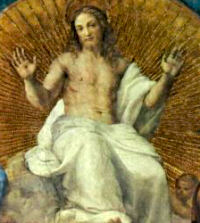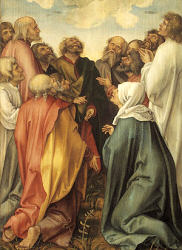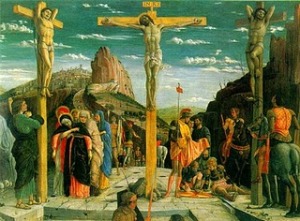“He was lifted up, and a cloud took him from their sight.” (Acts 1:9)
Today is a marvel of a feast day. Not only do we look back to Easter, when Jesus promised to be with us always. We also look ahead to Pentecost, when he will pour the love of God into our hearts through the power of his Holy Spirit.
But there’s more to the Ascension than this back-and-forth vision. Today we celebrate the day when Jesus took up his throne in heaven. Entrusted with all of creation, seated at the right hand of God, he is now surrounded by an unending cascade of heavenly worship. But what is he doing in heaven? Rather than just soaking in all the praise, he is constantly working for us—primarily by praying for us!
Don’t you find this amazing? You have someone speaking on your behalf—even singing your praises—to almighty God! Jesus is standing with you, his hand on your shoulder, like an advocate, praying not only for you but with you! He takes to himself all of your confusion, your pain, your needs, and transforms them. Miraculously, he even dissipates some of them!
You have the greatest pray-er in all creation on your side. What confidence that should give you! What hope and freedom from anxiety! You don’t have to go through your days feeling overwhelmed or underprepared. Jesus himself is standing with the Father, speaking boldly on your behalf. He is the God who is for you. So who, or what, can ever stand against you?
Sure, problems and pain may still come. But even in the midst of these, you can be confident that Jesus will obtain for you all the resources you need—even when you are dealing with sickness, poverty, imprisonment, or hunger. What’s more, he will even forgive you when you fall and help you to do better next time.
“Jesus, I praise you for your heavenly glory! I believe that you are my advocate before the throne of the Father. Help me experience your support and encouragement today.”
Psalm 47:2-3, 6-9; Ephesians 1:17-23; Luke 24:46-53
Questions for Reflection or Group Discussion
1. The first reading describes the ascension of the Lord. After Jesus ascends, we hear these words from what are obviously angels: “This Jesus who has been taken up into heaven will return in the same way as you have seen him going into heaven.” This is an obvious reference to Jesus’ Second Coming. How important to you is the Second Coming of the Lord? How important should it be? Why?
2. The responsorial psalm provides a foreshadowing of the joy and celebration that may have occurred in heaven upon Jesus’ ascension and return. Spend a minute or so in quiet reflection and try to imagine your first day in Heaven. What do you think it would be like?
3. In the second reading, St. Paul prays a powerful prayer for the believers in Ephesus, and for us. The resurrection and ascension of Jesus to the right hand of the Father is part of this prayer. Pray this prayer together slowly and meditate on the words as you do. What does this prayer mean to you?
4. The Gospel reading ends with the ascension of Jesus “up to heaven.” It goes on to say that his disciples “returned to Jerusalem with great joy.” The Ascension of Jesus is a day of great rejoicing and hope for us as well, no matter what our current circumstances are—as we look forward to our own ascension. Why is this so? What steps can you take to be more open to our risen and ascended Lord’s presence during the day?
5. The meditation reminds us that the Feast of the Ascension of the Lord is also when we “celebrate the day when Jesus took up his throne in heaven. Entrusted with all of creation, seated at the right hand of God, he is now surrounded by an unending cascade of heavenly worship. But what is he doing in heaven? Rather than just soaking in all the praise, he is constantly working for us—primarily by praying for us! Don’t you find this amazing?” Hebrews 7:25 describes it this way: “Therefore, he is always able to save those who approach God through him, since he lives forever to make intercession for them” Well? Do you find it amazing that Jesus is constantly praying and interceding for you? Why or why not?
6. Take some time now to pray to Jesus, now ascended and exulted at the Father’s right hand. .Ask the Lord to give you a heart of gratitude that he is your advocate before the throne of your heavenly Father. Use the prayer at the end of the meditation as a starting point.


 The death of a member of his family or of a loved friend, must be the saddest event imaginable in the life of an atheist. He is one who really is convinced that there is no God, no future life and therefore that the relative or friend is to turn into dust in the grave, never to be met with again. The thought that every day that passes is bringing him too nearer to that same sad fate, death, which will be the end of all his ambitions, all his enjoyments, the end of everything he thought he was or had, must be something hard to live with.
The death of a member of his family or of a loved friend, must be the saddest event imaginable in the life of an atheist. He is one who really is convinced that there is no God, no future life and therefore that the relative or friend is to turn into dust in the grave, never to be met with again. The thought that every day that passes is bringing him too nearer to that same sad fate, death, which will be the end of all his ambitions, all his enjoyments, the end of everything he thought he was or had, must be something hard to live with. 




 Images of Hope: Meditations on Major Feasts
Images of Hope: Meditations on Major Feasts

